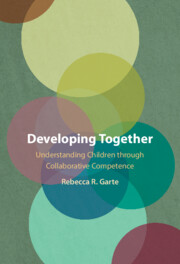Book contents
- Developing Together
- Developing Together
- Copyright page
- Dedication
- Contents
- Figures
- Tables
- Preface
- Acknowledgments
- Part I Collaborative Competence
- Part II Elements of Collaborative Competence
- Part III A New Theory and Method for Assessing Development via Collaborative Competence
- Chapter 7 Capturing the Complexity of Collaborations in Varied Settings
- Chapter 8 Principles for a Developmentally and Culturally Valid Methodology
- Chapter 9 Analyzing Components of Collaborative Competence during Preschooler Free Play
- Chapter 10 Collaborative Competence during Early Elementary Playful Learning Activities
- Part IV Implications for Theory, Research, and Practice
- References
- Index
Chapter 10 - Collaborative Competence during Early Elementary Playful Learning Activities
from Part III - A New Theory and Method for Assessing Development via Collaborative Competence
Published online by Cambridge University Press: 07 May 2024
- Developing Together
- Developing Together
- Copyright page
- Dedication
- Contents
- Figures
- Tables
- Preface
- Acknowledgments
- Part I Collaborative Competence
- Part II Elements of Collaborative Competence
- Part III A New Theory and Method for Assessing Development via Collaborative Competence
- Chapter 7 Capturing the Complexity of Collaborations in Varied Settings
- Chapter 8 Principles for a Developmentally and Culturally Valid Methodology
- Chapter 9 Analyzing Components of Collaborative Competence during Preschooler Free Play
- Chapter 10 Collaborative Competence during Early Elementary Playful Learning Activities
- Part IV Implications for Theory, Research, and Practice
- References
- Index
Summary
This chapter reports on the results of the coding scheme designed to assess collaborative learning activities during early elementary school described in Chapter 7. The scheme measures dialogic, activity-based, and nonverbal intersubjectivity and collaborative engagement. Three video-recorded, teacher-facilitated pedagogical activities are used for the analysis. These activities reflect findings from the play-based pedagogy literature in that they involve a mixture of teacher and child contributions. Teachers scaffold the engagement and understanding of a small group while following the children’s lead. Each activity includes open-ended exploration of a material by the children. The findings show that two different videos with the same teacher used similar forms of exploratory talk most often, whereas the other teacher used other forms of dialogue most often. In addition, intersubjectivity and collaborative engagement among all three groups peaked during active shared engagement with the materials. These periods coincided with less dialogue and occurred in the middle of the activity.
Keywords
- Type
- Chapter
- Information
- Developing TogetherUnderstanding Children through Collaborative Competence, pp. 177 - 206Publisher: Cambridge University PressPrint publication year: 2024



